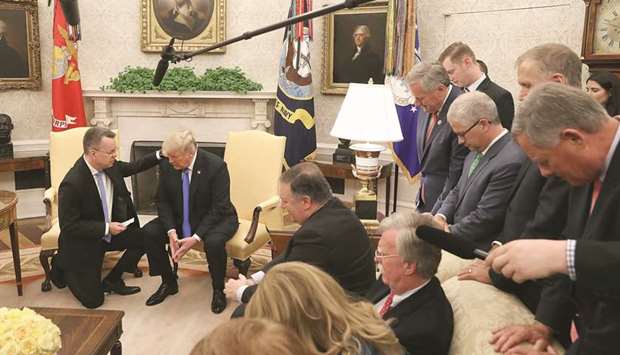The US pastor at the centre of a diplomatic spat between Washington and Ankara arrived back in the United States yesterday after being freed from house arrest in Turkey where he had faced terrorism charges.
Live television images showed Pastor Andrew Brunson meeting US President Donald Trump at the White House within 24 hours of being freed.
Trump told Brunson: “You are very, very special to all of us.”
The president said the two sides had been negotiating “long and hard”, and insisted that no ransom was paid.
Brunson – who has become a cause celebre for Trump’s conservative Christian base – thanked the president before kneeling before him, placing his hand on his shoulder and praying for Trump to have “supernatural wisdom”.
The Turkish government said yesterday that outside pressure did not influence a court’s decision to lift the house arrest and travel ban on Brunson.
“No Turkish office, especially our president, yielded to all the pressure, threats and outrageous statements,” said Omer Celik, a spokesman for the ruling Justice and Development Party (AKP).
Relations between Washington and Ankara soured over Brunson’s two-year detention, with the Trump administration slapping sanctions on Turkey’s justice and interior ministers.
The 50-year-old pastor was detained in October 2016 and arrested that December.
He was accused of links to the movement of Fethullah Gulen, an Islamic cleric who lives in exile in the US, whom Turkey blames for a failed coup attempt in July 2016.
Brunson was also accused of having ties to the outlawed Kurdistan Workers’ Party (PKK), which is designated a terrorist organisation by Turkey, the US, and the European Union.
A ruling by a Turkish court on Friday allowed Brunson to receive credit for time already served, meaning he could go free.
Brunson maintained his innocence throughout the process, and Trump administration officials have said the charges were politically motivated.
After a brief stopover in Germany for a medical check, Brunson arrived in Washington yesterday.
US media reported that the White House had struck a deal with Ankara, in which Brunson would be released and some charges against him dropped in exchange for the easing of economic pressure on Turkey.
“There was NO DEAL made with Turkey for the release and return of Pastor Andrew Brunson,” Trump tweeted in response to the reports. “I don’t make deals for hostages.”
“There was, however, great appreciation on behalf of the United States, which will lead to good, perhaps great, relations between the United States & Turkey!” he tweeted.
Erdogan responded: “I hope that the United States and Turkey continue co-operation in a manner that befits two allies.”
Turkey said its judiciary is independent of political concerns.
The case had seen Turkey and the US impose tit-for-tat sanctions on each other’s senior officials, as well as tariffs on imports.
Brunson is an evangelical Presbyterian clergyman who lived in Turkey for nearly half his life, initially moving there in 1993 as part of a missionary programme.
He was first detained in October 2016, faced up to 35 years in jail.
Prosecutors then demanded a sentence of up to 10 years.
The pastor has steadfastly insisted that he was not guilty.
“I am an innocent man. I love Jesus. I love Turkey,” he said in his final defence.
When the verdict was read out, Brunson wept and hugged his wife Norine.
After gathering his belongings, Brunson was driven to the airport in the Turkish city of Izmir, where he boarded a US military plane for Germany.
Upon arrival there for a refuelling stop, he kissed an American flag presented to him by Richard Grenell, the US ambassador in Berlin.
While the strain in US-Turkish relations eased with Brunson’s release, problems remain.
Secretary of State Mike Pompeo urged Turkey to “quickly release” other Americans in detention.
He said that Washington would “continue to work hard to bring home all American hostages and those wrongfully imprisoned and detained”.
National Aeronautics and Space Administration (Nasa) scientist Serkan Golge, a dual US-Turkish national, was jailed for seven and a half years in February on terror charges, a term reduced to five years last month.
And two Turkish employees of US diplomatic missions remain in jail.
One of them, former Adana consulate staffer Hamza Ulucay, was denied release on Friday.
Anthony Skinner, director for Middle East and North Africa at the Verisk Maplecroft consultancy, said that the US and Turkey had plenty of disagreements beyond Brunson.
“The clamp has now been removed, which opens the way for bilateral negotiations to address other sources of disagreement, but Washington and Ankara still have to navigate through a minefield,” Skinner said.
He pointed to Turkey’s order for Russian S-400 missile defence systems, which has riled its Western allies, as well as Ankara’s determination to do business with Iran in defiance of US sanctions.
Turkey is bracing for potential fines from US authorities over sanctions-busting by Turkish lender Halkbank, whose deputy director general has been jailed in the United States.

Trump and Brunson participate in a prayer at the Oval Office. Also seen are members of Congress and administration officials.
